
Trainings and Technical Assistance Have Widespread Impact
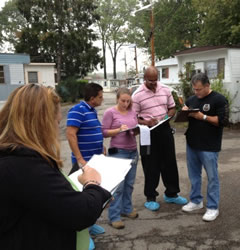 |
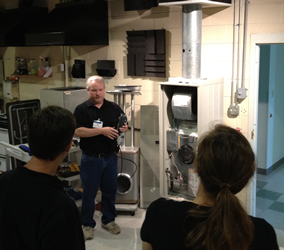 |
Training for Bergen County Community |
Training for Indiana Community Action Association |
Beginning in 2010, Weatherization Training Centers reaped many benefits from the trainings sponsored by the U.S. Department of Energy (DOE) and conducted by the Oak Ridge Institute for Science and Education (ORISE). The nationwide network under the Weatherization Assistance Program (WAP) includes more than 30 Weatherization Training Centers (WTCs) enrolled in a grant program. Many are WTCs administered by community action agencies or affiliated with state weatherization programs or colleges and universities.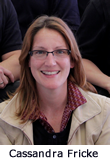
“The amount of technical and training support that DOE provides training centers has been amazing. We have learned exponentially because of the access to expert trainers,” says Cassandra Fricke, Training Manager, Community and Economic Development Association (CEDA) of Cook County, Chicago, Illinois. During the height of the American Recovery and Reinvestment Act (ARRA) funding, the CEDA weatherization training team operated with five training specialists. CEDA works in partnership with Wilbur Wright College.
“We took full advantage of the trainings. We learned a lot and enjoyed being challenged by peers and sharing best practices. Undeniably, we took the trainings very seriously so we could improve our program,” says Ms. Fricke.
When members of the CEDA weatherization team returned from trainings, they held debriefings so others on the team could examine the information and help decide how to incorporate it into the program.
“We continue to do that. We make it a point to pass around the curriculum and determine how it can be utilized,” says Ms. Fricke.
“The trainings have been essential on a couple of fronts,” says Steve Nall, Technical Team Leader, Indiana Community Action Association (INCAA), Indianapolis. “The Accreditation Workshop really helped focus our attention on the details that were essential in preparing an accreditation application. That was extremely beneficial training.” INCAA applied for accreditation from the Interstate Renewable Energy Council (IREC). Training Specialist Sam Daugherty, ORISE, and Project Manager Tony Hupp, ORISE, served as instructors at the Accreditation Workshop, held in Oak Ridge, Tennessee, in November 2012. Three webinars preceded the workshop to administer self-assessments and ensure participants were prepared for a document review.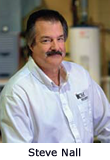
Mr. Nall also learned a lot at the Instructional Systems Design Workshop, facilitated by Mr. Daugherty. “We have been doing weatherization for decades and have a lot of experience in weatherization training, but we didn’t have a lot of experience in how to design the training. Over time I have put more effort into the design of our product—things like test design. I want to make good assessments, so I had to learn how to analyze my tests and make improvements,” says Mr. Nall.
Mr. Nall welcomed the opportunity to network at the training workshops and credits ORISE with improving communication and collaboration among training centers.
“I am very appreciative of ORISE’s efforts to help make this network better,” says Mr. Nall. He has utilized the technical expertise received from Bill Van der Meer, Training Specialist and Consultant with DOE, who presented at several workshops and facilitated evaluation exercises coordinated by ORISE.
“Bill always finds a way to make sure that he gets his point across. Bill is ready to engage in any way he can and is very helpful,” says Mr. Nall.
Mr. Nall is a regular participant in monthly Trainers’ Consortium calls, a networking project coordinated by Kelly Cutchin, a Weatherization Technical Advisor with Simonson Management Services (SMS). He also recognized Ms. Cutchin’s efforts to update the Weatherization Assistance Program Standardized Curricula.
“Kelly worked incredibly hard and has done a remarkable job in putting this together into very effective tools for the training centers,” says Mr. Nall, citing the usefulness of the updated modules, master bibliography, crosswalks, and lessons plans.
A collaborative effort between Ms. Cutchin and ORISE, the comprehensive and flexible tools assist new and experienced instructors in the weatherization workforce.
Mr. Nall also gives credit to Cynthia Simonson, Director, SMS, saying, “I have found her to be very knowledgeable and very engaged. She has really worked hard to make this program better. I think Cynthia’s efforts will be felt for a long time.”
Networking and sharing of information also benefited the trainers at Southface Energy Institute, Atlanta, Georgia.
“We have been able to talk with other training centers, see what they are doing, and find out about different strategies. Obviously a lot of us are doing the same thing, but we may have a different approach,” says Brad Turner, Program Manager, Residential Green Building Services, Southface. As he met others with expertise in certain areas, he has invited them to conduct trainings at Southface.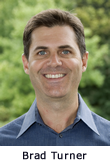
“The networking has enabled sharing of content—passing on technology to others,” says Mr. Turner. He participated in several trainings related to Instructional Systems Design, National Energy Audit Tool (NEAT), and Manufactured Home Energy Audit (MHEA). In addition to technical trainings, DOE has sponsored management trainings focused on sustainability, management, marketing, partnerships, procurement policies, and administrative best practices.
“We implemented those policies across the organization because they really made sense,” says Mr. Turner. When it came time to document business procedures for the IREC accreditation application, Southface staff was able to demonstrate its commitment to organizational policy and continual improvement.
The sustainability, management, and marketing trainings drew attention to the Weatherization Assistance Program’s goals and objectives, as defined by Jennifer Somers, Senior Policy Advisor, Team Lead for Training and Technical Assistance; and Josh Olsen, Policy Advisor/Training and Technical Assistance Specialist, Office of Weatherization and Intergovernmental Programs, DOE.
Mr. Turner also praises the assistance he receives from Jon Muckey, DOE Project Officer. “He is very approachable and he is helpful when we have questions.”
Trainings and teleconferencing are advantageous to Jon Phelps, Interim Executive Director, Louisiana Association of Community Action Partnerships (LACAP), Baton Rouge. He makes full use of teleconferencing when he needs technical advice and assistance. He stays in contact via phone and e-mail with Technical Training Specialists to find answers and gain insight into activities in other parts of the country. 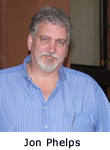
The LACAP weatherization training program has benefited from the expertise and professionalism gained from individual trainings and DOE-sponsored workshops. These assets have filtered down to the greater network of weatherization workers in Louisiana, according to Mr. Phelps.
“We have constant feedback—not every day, but definitely weekly—from our trainees who are out in the field, going into the homes, and doing the work. They say we’ve made our program better because of the extra training we’ve received and they’ve received,” says Mr. Phelps.
These positive comments from professionals in the field validate the efforts made by DOE leadership, affiliated Training Specialists, and Technical Advisors over the past three years. Through conferences, workshops, webinars, and one-on-one sessions either in person or over the phone, WTC staff members have gained tremendous knowledge and expertise in weatherization diagnostics, instructional design, auditing software, and training center management. They are well-equipped to move forward with accreditation efforts and achieve success in their communities. The overall impact of the training efforts will continue to grow in the years to come.
Chris Baker Helps Develop Mobile Combustion Safety App
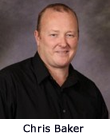 |
Chris Baker’s work in weatherization spans almost 20 years and his profession has experienced many changes. The shift to utilizing more technology hit home this year with the release of the Mobile Combustion Safety App. |
Foundation for Senior Living (FSL) Southwest Building Science Training Center, Phoenix, Arizona.
Mr. Baker realized the usual way of doing assessments—“writing down the numbers and hoping we were doing it right”—was not the trend of the future.
“Starting about three years ago, I noticed that a lot of contractors had smartphones,” says Mr. Baker, noting they preferred to work “paperless.” He and the FSL Home Energy Solutions team collaborated on the Mobile Combustion Safety App project with Advanced Energy, Raleigh, North Carolina.
Once developed, the team at Advanced Energy sent the app to Larry Zarker, Chief Executive Officer, Building Professional Institute (BPI), who had his colleagues take a closer look. The app burst into the market with an e-mail blast to more than 30,000 certified BPI subscribers.
“In less than two weeks, 1,500 people downloaded the app and began using it,” says Mr. Baker in amazement. Feedback has been very positive. The free app can be downloaded through the Google Android Marketplace or iTunes.
The app allows the weatherization worker to enter data for each step. The data will give feedback during testing and be stored for a final report. With a click, the completed report is saved to the smartphone or sent to the entered e-mail address.
“Nothing gets forgotten. The app takes care of everything,” says Mr. Baker.
Mr. Baker has extensive experience in blower doors and other energy auditing tools to diagnose efficiency problems in structures. In his three years with the FSL weatherization program, he has served as program administrator, crew trainer, and energy auditor/technician. He oversees training at the Home Performance Lab, a learning space built for testing and experimenting with weatherization materials and equipment. The five-floor “Super Lab” opened in 2012 and continues to attract attention.
“We probably have five or six tours a week,” says Mr. Baker about interest throughout the weatherization network. The structure was built specifically for training purposes. During the height of American Recovery and Reinvestment Act funding, the training center had about 900 students a year; now it serves about 450 students a year and it markets services to home performance programs. Course options have expanded to include training for sales and business management.
Mr. Baker ran a Weatherization Assistance Program in Wyoming for 10 years. He holds BPI Building Analyst, Envelope Professional, and Manufactured Housing certifications, as well as written and field exam proctor credentials for those designations.
Safety Tip: Non-contact Voltage
Detectors Save Lives
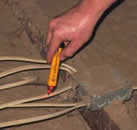 |
Workers in the energy retrofit industry are particularly vulnerable to electrical hazards and always need to keep in mind “If you’re not testing, you’re guessing.” |
Energy retrofitters should watch for potential electrical hazards at all times. Many houses contain a wide variety of wiring configurations and have amateur modifications that are dangerous and not up to code. Open junction boxes and unsheathed electrical conductors are often seen in attics and crawl spaces where energy retrofitters conduct the majority of their work.
A non-contact voltage detector should be in every energy auditor’s and weatherization technician’s tool box. Also known as a test pen, this device will detect an electrical field around AC energized objects such as wires and receptacles. No direct metallic contact is made with an electrical circuit. Detection relies on capacitive current to sense an electrical field near AC energized objects. The user simply touches a sheathed wire with the pen and an LED will light up if the wire is energized. This tool is particularly useful in detecting whether or not knob and tube wiring is live.
A test pen can be purchased from electrical suppliers for about $10-$20.
Trainers' Consortium Will Feature Mike Vogel
Participants on the next Trainers’ Consortium call will review lead-safe weatherization (LSW) and renovation, repair, and painting (RRP). They will discuss strategies for training the Weatherization Assistance Program workforce and updates to the curriculum. Mike Vogel of Montana State University will be lead presenter. The call is set for 3 p.m. (EST) Tuesday, April 2.
On the Horizon
2013 ACI National Home Performance Conference
April 30-May 3, Denver, Colorado
National Energy and Utility Affordability Conference
June 10-12, San Diego, California
ACEEE Summer Study on Energy Efficiency in Industry
July 23-26, Niagara Falls, New York
American Renewable Energy Day Summit
August 15-20, Aspen, Colorado
NASEO 2013 Annual Meeting
September 15-18, Denver, Colorado
EEBA: Excellence in Building Conference and Expo
September 24-26, Phoenix, Arizona
Quality Control Inspector Training Moves to Forefront
The need for training sessions for quality control inspectors will rise sharply in the next year as a number of new requirements begin to go into effect.
Beginning in 2013, all grantees are to begin training and certifying inspectors in preparation for a requirement for Quality Control Inspector certified individuals in 2015. Grantees are also to begin developing inspection plans to ensure that all work performed by the Weatherization Assistance Program (WAP) meets the minimum requirements for work quality laid out in the Standard Work Specifications (SWS) for Home Energy Upgrades.
Beginning in Program Year 2014, all work performed in the WAP will need to meet the standards for work quality outlined in the SWS and be inspected for compliance. Grantees will also need to submit a plan to DOE outlining their process for training and certifying individuals as Quality Control Inspectors.
Beginning in Program Year 2015 all work must be inspected by a certified Quality Control Inspector.
Weatherization Training Centers (WTCs) will see a demand for Quality Control Inspector trainings as people prepare to meet this requirement. WTCs can favorably position themselves to provide the necessary training by becoming an accredited center for Quality Control Inspector training.
The Interstate Renewable Energy Council (IREC) is the international body selected by DOE to grant accreditation to WTCs that meet its requirements. WTCs may apply for IREC accreditation for Retrofit Installer Technician, Energy Auditor, Crew Chief, and Quality Control Inspector. Efforts will be made to assist WTCs in working toward Quality Control Inspector accreditation.
“If a center has put in an application for one of the other accreditations, we will find out what assistance they need to also get accredited for Quality Control Inspector,” says Josh Olsen, Policy Advisor/Training and Technical Assistance Specialist, Office of Weatherization and Intergovernmental Programs, DOE.
Technical assistance and possibly train-the-trainer events will be available in the coming months to help WTCs make progress on their accreditation applications. Oak Ridge Institute for Science and Education has Technical Training Specialists to support WTCs through the steps. To learn more, contact Tony Hupp at Anthony.Hupp@orise.orau.gov or Sam Daugherty at Sam.Daugherty@orise.orau.gov.
Now Showing on WxTV:
Interior Containment
for Lead Safety
The second episode in the series “How to Be Lead-Safe” focuses on interior containment. Rules and procedures must be followed when renovations, such as window replacements, are made to homes built prior to 1978. WxTV host Ben Cichowski explains how to build a containment tent to prevent the spread of dust across a living area. To view this episode, visit www.wxtvonline.org.
